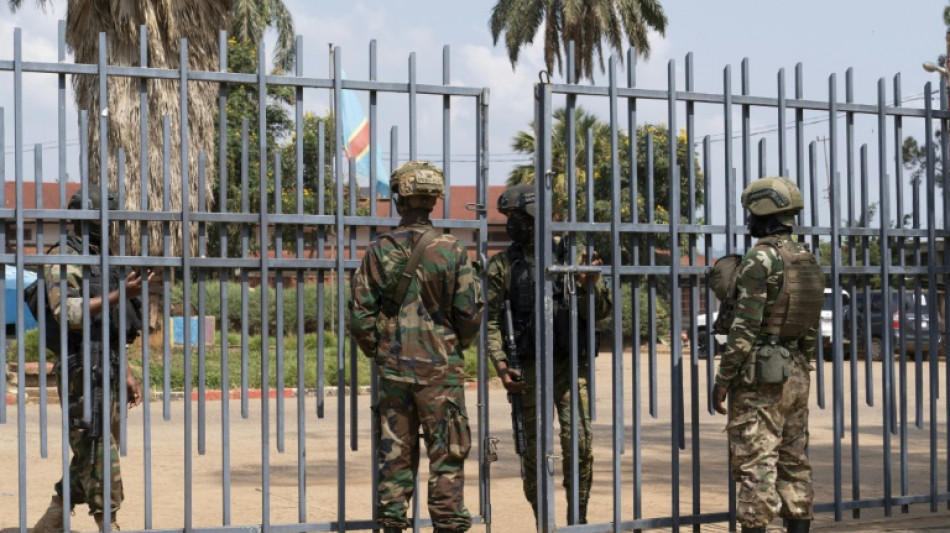
-
 Three killed in Taipei metro attacks, suspect dead
Three killed in Taipei metro attacks, suspect dead
-
Seven Colombian soldiers killed in guerrilla attack: army

-
 Amorim takes aim at Man Utd youth stars over 'entitlement'
Amorim takes aim at Man Utd youth stars over 'entitlement'
-
Mercosur meets in Brazil, EU eyes January 12 trade deal

-
 US Fed official says no urgency to cut rates, flags distorted data
US Fed official says no urgency to cut rates, flags distorted data
-
Rome to charge visitors for access to Trevi Fountain

-
 Spurs 'not a quick fix' for under-fire Frank
Spurs 'not a quick fix' for under-fire Frank
-
Poland president accuses Ukraine of not appreciating war support

-
 Stocks advance with focus on central banks, tech
Stocks advance with focus on central banks, tech
-
Amorim unfazed by 'Free Mainoo' T-shirt ahead of Villa clash

-
 PSG penalty hero Safonov ended Intercontinental win with broken hand
PSG penalty hero Safonov ended Intercontinental win with broken hand
-
French court rejects Shein suspension

-
 'It's so much fun,' says Vonn as she milks her comeback
'It's so much fun,' says Vonn as she milks her comeback
-
Moscow intent on pressing on in Ukraine: Putin

-
 UN declares famine over in Gaza, says 'situation remains critical'
UN declares famine over in Gaza, says 'situation remains critical'
-
Guardiola 'excited' by Man City future, not pondering exit

-
 Zabystran upsets Odermatt to claim first World Cup win in Val Gardena super-G
Zabystran upsets Odermatt to claim first World Cup win in Val Gardena super-G
-
Czechs name veteran coach Koubek for World Cup play-offs

-
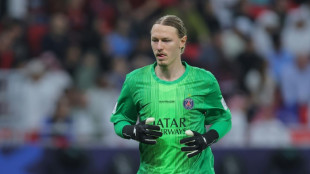 PSG penalty hero Safonov out until next year with broken hand
PSG penalty hero Safonov out until next year with broken hand
-
Putin says ball in court of Russia's opponents in Ukraine talks
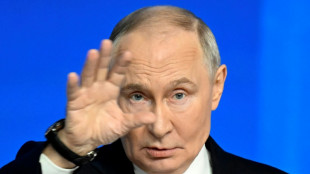
-
 Czech Zabystran upsets Odermatt to claim Val Gardena super-G
Czech Zabystran upsets Odermatt to claim Val Gardena super-G
-
NGOs fear 'catastrophic impact' of new Israel registration rules
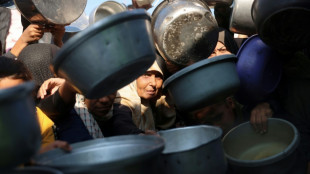
-
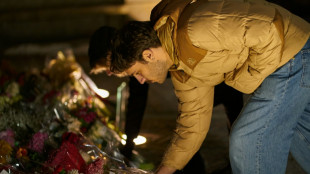 US suspends green card lottery after MIT professor, Brown University killings
US suspends green card lottery after MIT professor, Brown University killings
-
Stocks mixed with focus on central banks, tech
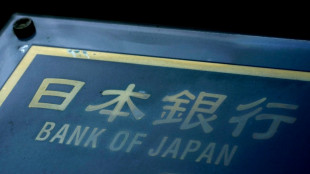
-
 Arsenal in the 'right place' as Arteta marks six years at club
Arsenal in the 'right place' as Arteta marks six years at club
-
Sudan's El-Fasher under the RSF, destroyed and 'full of bodies'
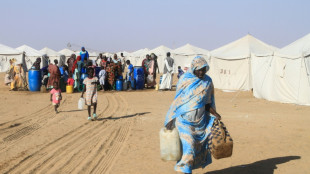
-
 From farms to court, climate-hit communities take on big polluters
From farms to court, climate-hit communities take on big polluters
-
Liverpool have 'moved on' from Salah furore, says upbeat Slot

-
 Norway crown princess likely to undergo lung transplant
Norway crown princess likely to undergo lung transplant
-
Iraq negotiates new coalition under US pressure
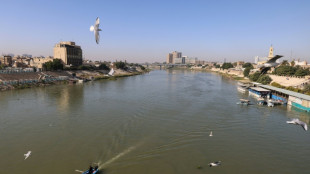
-
 France's budget hits snag in setback for embattled PM
France's budget hits snag in setback for embattled PM
-
Putin hails Ukraine gains, threatens more, in annual press conference
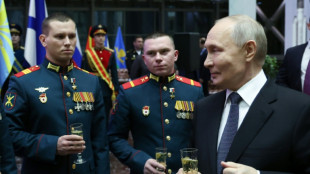
-
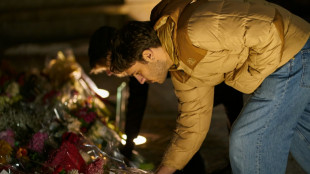 US suspends green card lottery after Brown, MIT professor shootings
US suspends green card lottery after Brown, MIT professor shootings
-
Chelsea's Maresca says Man City link '100 percent' speculation

-
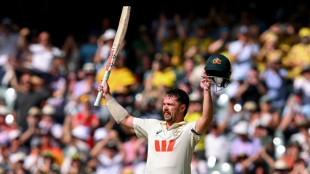 Dominant Head moves into Bradman territory with fourth Adelaide ton
Dominant Head moves into Bradman territory with fourth Adelaide ton
-
Arsenal battle to stay top of Christmas charts
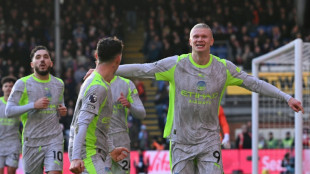
-
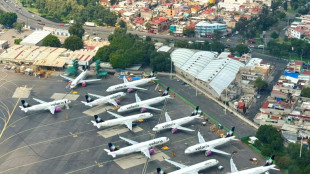 Mexican low-cost airlines Volaris and Viva agree to merger
Mexican low-cost airlines Volaris and Viva agree to merger
-
Border casinos caught in Thailand-Cambodia crossfire

-
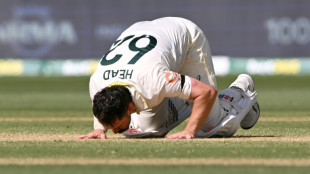 Australia's Head slams unbeaten 142 to crush England's Ashes hopes
Australia's Head slams unbeaten 142 to crush England's Ashes hopes
-
Epstein files due as US confronts long-delayed reckoning

-
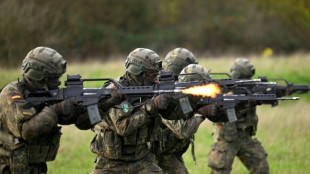 'Not our enemy': Rush to rearm sparks backlash in east Germany
'Not our enemy': Rush to rearm sparks backlash in east Germany
-
West Indies 110-0, trail by 465, after Conway's epic 227 for New Zealand
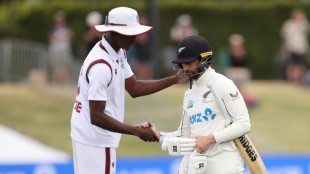
-
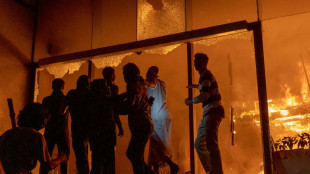 Arsonists target Bangladesh newspapers after student leader's death
Arsonists target Bangladesh newspapers after student leader's death
-
Volatile Oracle shares a proxy for Wall Street's AI jitters
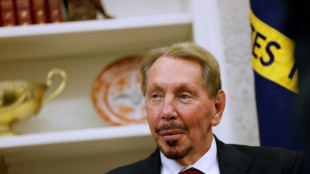
-
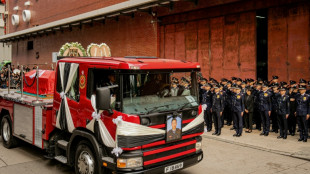 Tears at tribute to firefighter killed in Hong Kong blaze
Tears at tribute to firefighter killed in Hong Kong blaze
-
Seahawks edge Rams in overtime thriller to seize NFC lead

-
 Teenager Flagg leads Mavericks to upset of Pistons
Teenager Flagg leads Mavericks to upset of Pistons
-
Australia's Head fires quickfire 68 as England's Ashes hopes fade
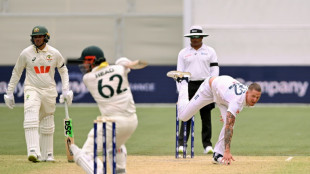
-
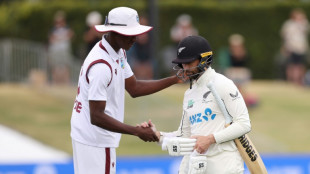 Conway falls for 227 as New Zealand declare at 575-8 in West Indies Test
Conway falls for 227 as New Zealand declare at 575-8 in West Indies Test
-
Japan hikes interest rates to 30-year-high


At night, crime and fear stalk DR Congo's M23-run areas
Every morning the Congolese city of Bukavu, now under the control of the Rwanda-backed M23 movement, counts its dead.
Corpses are discovered at dawn, lying in the steep streets of the capital of South Kivu province, which has been in the hands of the anti-government group since mid-February after it launched a lightning offensive.
The Congolese administration deserted the area after the M23 fighters and their Rwandan allies seized the city in the volatile eastern Democratic Republic of Congo, meeting virtually no resistance.
The M23 had already taken control of another major city in eastern DRC, Goma, at the end of January.
But the armed group has struggled to keep a grip on the vast area it has captured.
There, no one really knows the circumstances surrounding nightly killings, or can identify their perpetrators with certainty.
Territories under M23 control no longer have courts or prisons and hardly any police at all.
Bukavu's two million or so inhabitants can enjoy some level of normalcy during the day -- but when it gets dark, the streets empty out.
"We stay up all night. Bandits can break into our homes at any moment," said Jean Bosco, a Bukavu resident, who said he hurries home before nightfall.
Congolese troops who fled the city left their weapons behind, which were then picked up by criminals.
Thousands of pro-Kinshasa "wazalendo" ("patriots" in Swahili) militia members, known for their exactions and lack of military discipline, have hidden in neighbourhoods surrounding the city.
They have been joined by hundreds of criminals released from prison.
In small groups, they rob and break into homes.
A lack of cash in M23-governed areas, where banks shut down months ago and are no longer supplied by authorities in the capital Kinshasa, also feeds criminality.
- 'Widespread fear' -
"Last week, they broke into my sister's place, they hit her in the head to make her hand over her belongings," Bosco said.
"Not a night goes by without talk of households being attacked," said Amos Bisimwa, who represents civil society groups in Bukavu, speaking of "widespread fear".
Residents try to organise themselves as best they can, buying whistles to alert neighbours in the event of an attack and lamps to light up the streets.
Lynchings of suspected criminals, sometimes cover-ups for revenge killings, have been widely documented by humanitarian and civil society groups.
The United Nations has also accused the M23 movement of extrajudicial killings of alleged criminals, who sometimes are aged under 18.
According to security sources, the M23 has between 6,000 and 10,000 fighters deployed on the ground and currently relies on the millions of people living in areas it controls to report criminals.
But it faces a certain level of reluctance, with some fearing reprisals and others putting up a form of passive resistance.
This is especially the case in cities, which are "more politicised than the countryside", said Onesphore Sematumba, a researcher with the International Crisis Group.
After taking Goma, "the M23 faced a dilemma: stay in Goma to consolidate its positions and demonstrate its ability to run (these areas), or take advantage of the lack of resistance to chase the Congolese army as far as possible and force Kinshasa to negotiate," Sematumba said.
By taking Bukavu and considerably expanding its territory, he added, "the M23 finds itself everywhere and nowhere".
- 'Tired of constant wars' -
The hills surrounding Bukavu and Goma have turned into a refuge for thousands of "wazalendo" militia members, who descend into the cities to carry out acts of guerrilla warfare and loot homes.
On April 11, militia members launched a nighttime attack on Goma but were swiftly pushed back by the M23, with intense fire resonating across several neighbourhoods.
Two days later, they launched an incursion into Bukavu's Kavumu district, where the airport is located.
M23 spokesman Lawrence Kanyuka later invited the media onto the airport's tarmac where he said the group was doing its "best to secure the population 24 hours a day", while acknowledging that the "wazalendo" were committing "crimes every day".
In downtown Kavumu, a young man speaking on condition of anonymity said he was "tired of the constant wars".
"If the wazalendo show up, we'll applaud them. If the M23 rebels show up, we'll do the same," he said.
The M23 group, which hopes to garner popular support through good governance, aims to also beef up its ranks.
Thousands of Congolese policemen and soldiers who have joined the M23 are receiving technical and ideological training.
Some were already deployed at the weekend, an M23 representative told AFP.
D.Schneider--BTB
